Saturday evening we attended the Santo Niño celebration at St. Pius X in Corpus Christi, TX. Well, the Mass, actually. Since our Bible study group had engaged in a thoroughly invigorating discussion on the Sunday readings— the “Wedding at Cana” in particular— Steven and I had anticipated that Bishop Mulvey’s homily was sure to be the icing on the proverbial cake. For this reason, I recorded his homily (below) to share with the group.
Setting the tone
 A marvelous story of Santo Niño and so many other stories of protective help from the saints, from Mary, from God. We’ve moved them back into history. When you think about the feast, the miracle of Santo Niño back in the 1600s, you look at the life of the people, probably very simple. Very simple, simple life. They had the elements of the earth. They depended on the rain to water their crops. They depended on the water to produce fish. They needed the elements of the earth. They needed the help of God. They relied upon the help of God. And we see that notion throughout the scriptures.
A marvelous story of Santo Niño and so many other stories of protective help from the saints, from Mary, from God. We’ve moved them back into history. When you think about the feast, the miracle of Santo Niño back in the 1600s, you look at the life of the people, probably very simple. Very simple, simple life. They had the elements of the earth. They depended on the rain to water their crops. They depended on the water to produce fish. They needed the elements of the earth. They needed the help of God. They relied upon the help of God. And we see that notion throughout the scriptures.
As we rise every morning in the Office that we pray as priests, religious, and lay people in the church, the opening psalm is the psalm of praise to God that he has created us, at heart that we should not harden our hearts against him but [be] open to God’s help.
I say that because we might, each one of us, think of this morning and yesterday morning and the morning before. [What was] the first thing you did when you got up? What did you think of? If you try to examine yourself, say, “As I get up each morning, who do I rely upon?”
I think, if we’re honest, we’re going to rely upon the TV— turn it on first, get the news. Gotta get the news. Gotta go to that computer. Gotta go to that iPhone. Gotta go to that text message.
We have become dependent on all of these things. And the question for us is [this]: In the midst of all this relying on news and media and connection with my friends on facebook around the world and all these things that I need to exist, where is [my] God?
Have these things become our gods because God is what is beyond us? God is the one who is superior to us. But God is also the one who loves us, tenderly, gently. And so, if we examine ourselves, sisters and brothers, and we think about just the very simple act of getting up in the morning, do we get up with a grateful heart and say, “Good morning, Lord Jesus?” “Good morning, Father of mercies?” “Good morning, another morning, so that I can rely on you?”
How we get up in the morning sets the tone for the day. Sets the tone for the day.
If I get up immediately relying upon technology, then my day will be technological. And, when I get exhausted by the end of the day, I’ll say— gasp— “Oh, I forgot! Hail Mary, full of grace. The Lord is with thee. Blessed art thou amongst women. In the name of the Father and the Son. Goodnight, Lord.” But that’s not who we are as a people. The beautiful faith of the Filipino people and so many other rich, rich cultures of faith rely from the very beginning on the love, the mercy, of God.
Goodness and hope
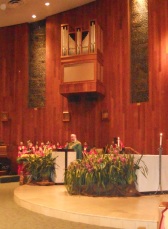 I had a pastor that I worked for as a deacon in England. He was part of the Apostleship of the Sea, which is very close to our seamen here in the Port of Corpus Christi and probably many of your own family members.
I had a pastor that I worked for as a deacon in England. He was part of the Apostleship of the Sea, which is very close to our seamen here in the Port of Corpus Christi and probably many of your own family members.
He told me one thing as a young deacon. He said, “Michael, the people who are closest to God are the ones who are closest to the elements of the earth. They, too, are those who work with the land and those who work at sea because they rely and depend upon God’s goodness.”
In the Philippines, especially in the past years, you know that the weather and the elements of the water have brought great destruction. But the faith of the people grows even more.
So many farmers in this area with the drought have really felt devastation, and yet there’s that hope that continues to live in them. No machine can do that for us.
Finding meaning
And so as you celebrate— as we celebrate— this evening, I think it’s important to go back to those rudimentary principles of who we are as human beings, created not manufactured, created not in a laboratory but in the image and likeness of God in our mothers’ wombs. Simple. Thank you very much. And it’s because of that human nature that we rely upon the divine.
Look at Jesus. In the gospel of John, several times, he said, “I have not come to do my own will, but the will of my Father.” [He tells] us, “I’ve not come to do my own thing. I rely upon, I depend upon, I find my meaning and my fulfillment in God’s will for me.”
What did that mean? He had to stay in close contact with him. And he didn’t have an iPhone. He didn’t have facebook. He didn’t have all these mechanisms we have to stay in touch with his Father. What he had was prayer. What he had was a secluded place in the mountains or in the back yard to be silent and listen to the Father.
That’s how Jesus got up every morning, giving praise to the Father. That’s how he lived the day. And that’s how he returned to a night’s sleep, depending on the will of the Father in all that he did.
Seeking God’s will
And so we find ourselves saying sometimes, “You know, WWJD. What would Jesus do in this moment?”
Well, there’s a bigger question. There’s a bigger context. What does Jesus want? What does God want of you, especially the young people? Have you ever thought— What does God want from you, not what you want to do [or] what your parents and your grandparents want you to do? What does God want of your life?
We see St. Paul in the reading today lining out [the] different ministries. There are different ways to serve God. That’s what the body of Christ is all about. Different ways. Nothing’s I invent, but how God calls each one of us forth to do his will. And to do his will, I can’t put a magic formula in somewhere. I’ve got to listen. I’ve got to be able to pray and listen with silence.
I would’ve never thought, ever, of being a bishop. Many of you probably would not have ever thought of doing some things that you’ve done or be someone that you are. But it’s by God’s grace, and so we have to listen.
Making connections
 We have today in the gospel a marvelous story of listening to one another, a story that you all know. If I were to ask you— as adults or people who go to religion class, CCD— [to] tell me the story of the wedding feast of Cana, you could tell it, probably. No problem. Still ain’t right? You know it. The familiar story, we know it. But what really was happening there?
We have today in the gospel a marvelous story of listening to one another, a story that you all know. If I were to ask you— as adults or people who go to religion class, CCD— [to] tell me the story of the wedding feast of Cana, you could tell it, probably. No problem. Still ain’t right? You know it. The familiar story, we know it. But what really was happening there?
What was really happening there?
Jesus was invited to a wedding feast. He was not a religious stuck-in-the-mud, you know, kind of guy that had a long face and didn’t enjoy being in people’s homes or enjoy being at a wedding. He went!
Some scholars say it may have been one of Mary’s in-laws that was getting married, so she was there as kind of a hostess. And she saw that the wine was missing. So she went over to Jesus, who, by the way, brought some uninvited guests.
You ever been to one of those parties where somebody brings five extra people with them that you weren’t planning? We’re not saying that they drank the wine and made it go bad or made it go away, but they were out of wine. Probably other people brought extra guests.
They were in need. And there was Mary. She saw that because, perhaps, she was kind of the hostess of the day. So she went over to Jesus.
“Son, they have no wine.”
Language of the day
Now the response many of us will say is, “Wow. I wouldn’t treat my mother like that.”
“Woman, what does your concern have to do with me?”
We always have to go back to the language of the day. Many scholars say that language— “woman, what does your concern have to do with me”— basically says “Mom, I’ll take care of it.”
I’ll take care of it.
Not the way she thought or not the way other people were taught. “Well, you have to go down to the grocery store or to the wine store and get some more.” You know, all those kinds of things. How did that ever happen? But, remember, Jesus came to do the will of the Father. And that’s why he said, “My hour has not come yet, but don’t worry.”
Fulfilling God’s will
And so he just took the simple jars of water— six jars, thirty gallons each— and changed water into wine. A simple gesture to take care of people’s needs so that the party could continue. But look at the relationship of Mary and Jesus.
Mary depended on Jesus. Jesus depended on his Father so that this miracle could happen. But, in other parties, he said, “My hour has not yet come.” In other words: “It’s not time for me to do that first miracle.”
The hour that Jesus is speaking of is the hour on the cross. That was the miracle of miracles. That’s why he came. That’s why the Father sent him. That’s what he was anticipating. That’s why, whenever he did a miracle, he said “don’t tell people” because that’s what [they were] waiting for— redemption. But Jesus was so in tune with his Father and so in tune with his mother that he did what was needed at the time.
This happened, friends, at a wedding.
So many times today I think people— we’ve— lost a sense of the dignity and the sacredness of a wedding feast in the Church. Jesus went to a great wedding feast where everyone participated, where it was part of his faith. He went there. But the other beautiful thing was that it was at somebody’s home.
You know, when people think of miracles, they’re always looking for some big bash, some big splash somewhere. This was at somebody’s home! Something that was needed right there in front of them, something simple. And it was Jesus responding in that simple way in simple people’s lives to bring about a simple solution to a need.
Living the gospel
 And so what does all that say to us today? How do we bring that gospel of two-thousand years ago into our own lives?
And so what does all that say to us today? How do we bring that gospel of two-thousand years ago into our own lives?
We all have needs. We all get disappointed. Things happen to us in a given day. Things happened today.
Who do we rely upon? To whom shall we go?
Remember when the people left Jesus after he transformed the bread. He multiplied the loaves so that everyone could eat? He said, “I am the bread of life.”
And people left!
So, to his disciples standing there, he said, “Will you leave me, too?”
And they said, “Lord, to whom shall we go? You have the words of eternal life.”
When things don’t go our way in life— we have a bad day— [or] when something tragic happens in our lives, to whom do we go?
Do we go and kneel down and offer our life to the Father, depending on him? Or do we try to resolve every situation that we have the way we think it should be resolved?
If we do that, sisters and brothers, we close the door to Santo Niño. We close the door [and] say, “We don’t need you. I’ll take care of it. I’ve got a computer. I’ve got a TV. I’ve got all these things. I’ve got a car. I’ll take care of it.”
But that’s not who we are. That’s not who you are as men and women of faith. Stand there and say, “Lord, to whom shall we go? You have the words. You have the resolve for everything.”
God’s loving mercy
 Those stone jars, sisters and brothers, I think for this Year of Mercy represent the abundance of God’s mercy.
Those stone jars, sisters and brothers, I think for this Year of Mercy represent the abundance of God’s mercy.
You know, [like] St. John, you can’t just [think], Okay, there’s six jars, thirty gallons each, one-hundred eighty gallons. You can’t look at it that way because St. John always had a symbol [for] what [he] saw.
In this Year of Mercy, we can definitely see those six jars, water becoming now wine, richness. Those represent God’s mercy coming to a difficult situation.
During this Year of Mercy, let us look at those jars and say, “That’s God’s merciful grace overflowing in my needs.”
Whatever happens to you today, tomorrow, the next day— let’s not limit it to this year but the rest of our lives— but [for] the rest of this year, make a resolve tonight. Whatever happens today, whatever happens this year, depend on the grace of God.
Don’t try to solve it yourself. Go to your knees. Stand in front of the Lord and say, “Your will be done.” Not just as a saying that your grandmother or mother taught you. Say it from the depth of your heart.
“Your will be done. I don’t understand. I don’t know why this happened. I don’t want this to happen.”
And, just as Jesus stood in front of that couple that needed something— it would’ve been a shame in the culture of the time to run out of wine— his abundant grace [will flow] over and [come] to [your] aid, [too].
And so, sisters and brothers, as we rededicate ourselves to Jesus Christ in the figure of Santo Niño, praying for all the needs of families in the Philippines and people throughout the world, let us do our part to be men and women of faith who love God so much that we depend not only on the technology of today but, first and foremost at the beginning of every morning, on God’s grace and loving mercy (Bp. Michael Mulvey; January 16, 2016; transcribed audio recording, edited).
Evening prayer to God by St. Macarius
O eternal God and Ruler of all creation, you have allowed me to reach this hour. Forgive the sins I have committed this day by word, deed or thought. Purify me, O Lord, from every spiritual and physical stain. Grant that I may rise from this sleep to glorify you by my deeds throughout my entire lifetime and that I be victorious over every spiritual and physical enemy. Deliver me, O Lord, from all vain thoughts and from evil desires; for yours is the kingdom and the power and the glory, Father, Son, and Holy Spirit, now and ever and forever (American Catholic Truth Society).
January 23, 2016
“The world tells us to seek success, power, and money; God tells us to seek humility, service, and love” (Pope Francis).
January 24, 2016
By turning your eyes on God in meditation, your whole soul will be filled with God. Begin all your prayers in the presence of God (St. Francis de Sales).
January 27, 2016
Turn your eye to God’s will and see how he wills all the works of his mercy and justice in heaven and on earth and under the earth. Then, with profound humility, accept, praise, and then bless this sovereign will, which is entirely holy, just, and beautiful (St. Francis de Sales in Roses Among Thorns).
January 30, 2016
“God gives each one of us sufficient grace ever to know his holy will and to do it fully” (St. Ignatius of Loyola).
June 1, 2016
We set forth our petitions before God not in order to make known to him our needs and desires, but rather so that we ourselves may realize that in these things it is necessary to turn to God for help (St. Thomas Aquinas).
June 11, 2016
“Trust the past to the mercy of God, the present to his love, and the future to his providence” (St. Augustine).
November 18, 2016
Let us never lose courage or despair of God’s mercy. We have only to humble ourselves before God in order to obtain grace to become all that we ought to be (St. Rose Philippine Duchesne).
November 21, 2016
Humility is the virtue of our Lord Jesus Christ, of his blessed Mother, and of the greatest saints. It embraces all virtues and, where it is sincere, introduces them into the soul (St. Vincent de Paul).
November 28, 2016
We shall never learn to know ourselves except by endeavoring to know God; for, beholding his greatness, we realize our own littleness. His purity shows us our foulness; and, by meditating upon his humility, we find how very far we are from being humble (St. Teresa of Ávila).
June 13, 2017
O the mercy of God! Never does he refuse to be merciful, but is ever present to those who turn to him (St. Anthony of Padua).
July 6, 2017
When Moses was called to lead the people out of Egypt, God told him, “I will be with you.” When Joshua was called to lead Israel into the Promised Land, God said to him, “I will be with you.”
In each case, the person was commissioned to take on a difficult task with many risks and challenges. Often they felt inadequate and ill-prepared. Nevertheless, God challenged them to step outside their comfort zones and rely on him as never before. While they may not have felt ready for the job, they were given the one thing they needed most to carry out their task: The Lord would be with them.
We need to hear that message too. How might God be asking you to rely on him more, to trust that the Lord is truly with you in whatever you might face in your life right now? (Edward Sri in Praying the Rosary Like Never Before).
June 24, 2019
“God’s mercy is the only continuity we can be sure of and so we learn to be grateful that this gift, not our own wisdom or discipline, is what will get us home” (Pat Marrin).
Pdf file… Child Jesus chaplet prayers…
Links of interest… Apostleship of the Sea… Are your decisions born of fear or love… Bringing back what is true & good… Diocese of Corpus Christi (bishop)… Evening prayers… Forgiveness & contemplation in prayer… Humility… Office: about / breviary / liturgy of the hours… Practice of the presence of God… Saintly former slave a model of mercy… Santo Niño de Cebú: basilica / devotion / feast (more) / history / homily / novena / origin / perpetual novena / song… Seven ways to live out mercy in our lives… Signs & symbols (Mary McGlone, CSJ)… South Texas Catholic… St. Pius X: facebook / website… Year of Mercy makes sense only if you haven’t lost the sense of sin (basis)… You can trust in the mercy of God…
WP posts… Beloved joyful priest… Call of service… Celebrations… Multicultural Mass… Santo Niño
Filed under: call of service, Child Jesus, homilies, liturgical year, Ordinary Time, Our Lady, prayer, spiritual gifts | Tagged: building community, God's master plan, overcoming adversity, St. Pius X-Corpus Christi TX |







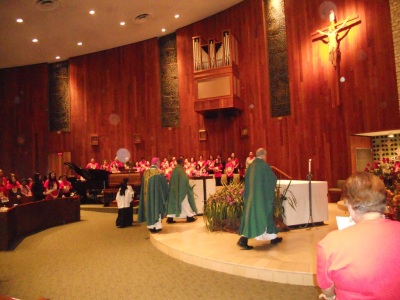
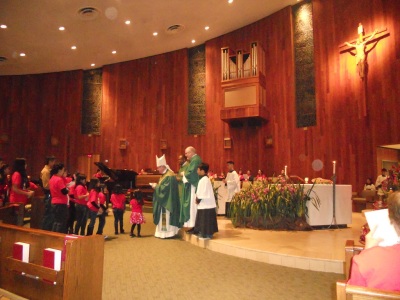














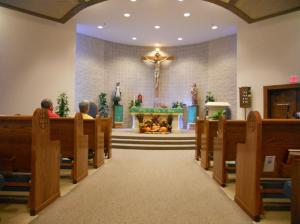
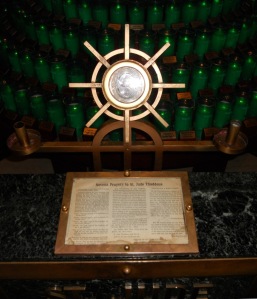









Leave a comment